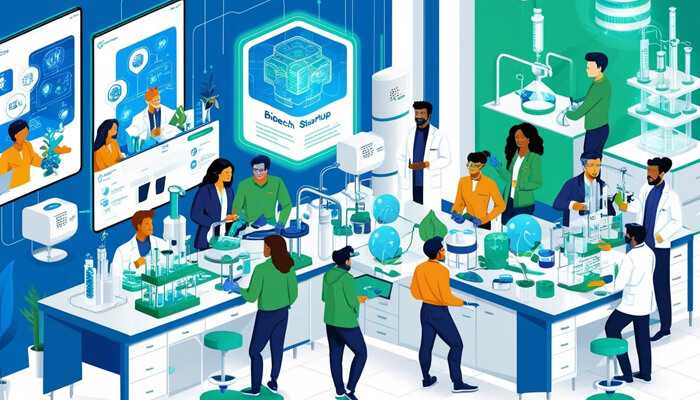The biotech industry has always thrived on the cutting edge of scientific advancements. From groundbreaking research in genetics to the development of life-saving drugs, laboratories serve as the heart of biotech innovation. In recent years, new technologies and improved laboratory methodologies have accelerated the pace at which biotech startups can bring their ideas to life, reducing costs and time to market. These advancements are not just fueling innovation but also making it easier for small companies to compete in an industry traditionally dominated by giants.
The Evolution of Biotech Laboratories
Historically, laboratory research required significant investment in infrastructure, highly trained personnel, and specialized equipment. However, the emergence of automation, artificial intelligence, and cloud-based technologies has revolutionized how biotech startups operate. Modern laboratories are now more efficient, cost-effective, and adaptable than ever before.
One of the most impactful changes has been the rise of high-throughput screening, which allows researchers to test thousands of compounds or genetic variations in a short period. This capability drastically shortens drug discovery timelines and enhances the efficiency of biotech firms. Additionally, the advent of organ-on-a-chip technologies is replacing traditional animal testing, making research more ethical and reliable while reducing development costs.
The Role of Artificial Intelligence and Automation
Artificial intelligence (AI) is playing an increasingly important role in biotech labs. Machine learning algorithms can analyze vast amounts of data, identifying patterns and insights that human researchers might miss. AI-driven platforms are accelerating drug discovery, optimizing experimental conditions, and even predicting potential side effects before clinical trials begin.
Automation is another game-changer. Robotic systems are now capable of performing complex laboratory tasks with minimal human intervention. These technologies reduce human error, increase efficiency, and allow startups to operate with leaner teams. Automated liquid handling systems, for example, ensure precise measurements and reproducibility in experiments, which is crucial for regulatory approval and scaling production.
Cutting Costs with Cloud-Based Solutions
Biotech startups often struggle with high operational costs, particularly when it comes to data storage and computing power. The rise of cloud-based platforms has alleviated this burden by providing scalable solutions for data analysis, collaboration, and storage. Scientists can now access vast computational resources without needing to invest in expensive in-house servers.
Cloud platforms also enable real-time collaboration between researchers across different locations. This is particularly valuable for biotech startups that partner with academic institutions, pharmaceutical companies, or international teams. By reducing the need for physical infrastructure, cloud computing allows biotech firms to allocate more resources to innovation rather than operational overhead.
A Practical Approach to Lab Innovations
One of the biggest advantages of modern laboratory innovations is their accessibility to startups. Unlike in the past, when biotech research required massive investments, many of today’s advancements are designed with cost-effectiveness in mind. Companies can now rent lab space in shared facilities, utilize subscription-based software for bioinformatics analysis, and access specialized equipment through partnerships rather than outright purchasing.
These practical approach methods allow startups to focus on their core research while leveraging the latest technologies without the need for heavy capital investments. By optimizing workflows and reducing waste, laboratory innovations ensure that biotech startups can operate with agility and efficiency.
The Impact on Drug Development and Personalized Medicine
Advancements in laboratory technologies are also transforming the field of personalized medicine. Genetic sequencing, once prohibitively expensive, is now more affordable and accessible. This has enabled biotech startups to develop targeted therapies based on an individual’s genetic makeup, leading to more effective treatments with fewer side effects.
For example, CRISPR gene-editing technology is revolutionizing how genetic disorders are treated. Small biotech startups are now able to explore gene therapies that were once the domain of only the largest pharmaceutical companies. By leveraging laboratory innovations, these companies can bring novel treatments to market more rapidly, addressing previously untreatable diseases.
Overcoming Challenges with Innovative Solutions
While laboratory innovations offer numerous benefits, biotech startups still face challenges, such as regulatory hurdles and the need for funding. However, technology is helping to mitigate these issues. Advanced simulation software is assisting researchers in predicting the success of drug candidates before they even reach clinical trials, reducing the risk of failure. Additionally, blockchain technology is being explored for data integrity and compliance, ensuring that experimental results are tamper-proof and meet regulatory standards.
Access to venture capital and public funding is also improving as investors recognize the potential of laboratory-driven biotech advancements. Many biotech accelerators and incubators now provide startups with not just funding but also access to cutting-edge lab facilities and mentorship from industry veterans. This ecosystem of support is crucial for ensuring that innovative ideas can transition from the lab to the market.
The Future of Biotech Startups
The trajectory of biotech startups is set to continue its upward momentum, largely driven by laboratory innovations. As new technologies emerge, startups will be able to operate with even greater efficiency, reducing development times and costs. The integration of AI, automation, and cloud computing will further streamline research processes, allowing companies to focus on groundbreaking discoveries rather than logistical constraints.
Additionally, collaboration will play an increasingly significant role. With digital tools enabling seamless global communication, biotech startups will continue to leverage partnerships with research institutions, healthcare providers, and regulatory bodies. This interconnected approach will drive further advancements, making biotech solutions more accessible and effective for a broader population.
Conclusion
The biotech landscape is undergoing a profound transformation, fueled by innovations in laboratory technology. From AI-driven drug discovery to automation and cloud computing, these advancements are leveling the playing field for startups, allowing them to compete with established industry leaders. By adopting a practical approach, biotech firms can maximize efficiency, reduce costs, and accelerate the development of life-saving treatments. As these innovations continue to evolve, the potential for groundbreaking discoveries in medicine and beyond remains limitless.



